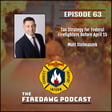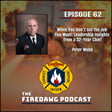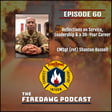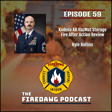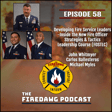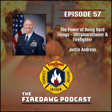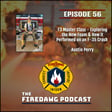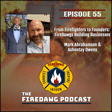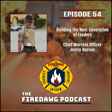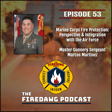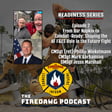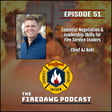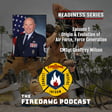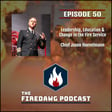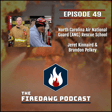Become a Creator today!Start creating today - Share your story with the world!
Start for free
00:00:00
00:00:01

52. From Firefighter to Air Advisor - Insights of a Unique Path - Quentin Patterson
In this episode, Matt speaks with TSgt Quentin Patterson, an Air Force firefighter turned Air Advisor. With experience supporting partner nations across Africa and beyond, Quentin has been part of missions in Senegal, Tanzania, Ghana, Chad, France, Morocco, and Cameroon.
Quentin shares his journey in air advising including the training and his experiences, and gives insight into how his work impacts global security. He also discusses how this unique path will open doors for future opportunities within and outside the military.
Transcript
Introduction to Episode 52
00:00:00
Speaker
This is the Firedog Podcast.
00:00:13
Speaker
Welcome my name is Matt Wilson and thank you for joining us for episode 52 of the Firedog Podcast.
Advising Foreign Air Forces and Safety Assessments
00:00:18
Speaker
In today's episode I have the privilege of speaking with Tech Sergeant Quentin Patterson, an Air Force firefighter and now seasoned air advisor with experience supporting nations across Africa and beyond. Tech Sergeant Patterson has been involved in a wide range of operations from advising foreign air forces in Senegal to leading key leader engagements in Tanzania and conducting airfield and fire safety assessments in Ghana and Chad. His position has also taken him to places like France, Morocco, and Cameroon. In today's episode, Quentin shares his journey into the air advisor career field, dives into his training and experiences on the ground, and discusses how his training and missions have shaped his view of global security and military partnerships.
00:00:59
Speaker
He'll also touch on how the unique experience will benefit him in future roles both within and outside of the military.
Career Journey and Global Security Perspectives
00:01:06
Speaker
It is my pleasure to welcome Tech Sergeant Quinton Patterson. Quinton, welcome. It's great to have you. It's a long time, no see. Yeah, it's been a while. It sure has. And as we were talking before I hit record, which I wish we would have got some of it on recording. That's why I kind of hastily hit the record button on us.
00:01:28
Speaker
Quentin and I go way back. He and I were together at J-Bear at one point in time. When did you show up there, 2014? March 2013, March 2013. That's the same month I showed up, so that lines up. They ah they signed assigned me, Quentin, as a troop, Staff Sergeant Wilson.
00:01:53
Speaker
Yeah man, I remember that. It's crazy. Yeah. But now you're doing big things as an air advisor. Station where?
Role and Responsibilities of an Air Advisor
00:02:03
Speaker
Yeah, so right now I'm at McGuire Air Force Base at JBMDL i out here in New Jersey. Gross. Yeah. Just kidding. Pretty unfortunate, but it's not too bad. It's not too terrible. No. ah who did we Who did I have on?
00:02:18
Speaker
the, uh, Oh man, his name escapes me. Talk to a couple of people that are up at JBM deal on the podcast. Well, I guess wink kind of counts as one too. Yeah, kind of. Cause he was, he was there at one point in time. Good place. A lot of folk, big department, but you are not working in the fire department there. I am not, um, kind of a lone survivor out here, um, in the CRW.
00:02:46
Speaker
CRW so that is kind of it's kind of like along the same lines with those silver flag guys work within contingency response Something yes, so so they're in the they're in the CRGs usually CRT. Okay. Yes, so the contingency response group, but there's only one CR wing here 621 CRW gotcha cool, well we Start rolling into it We are going to talk about what exactly an air advisor is and I will be honest, i um I'm not too familiar with what an air advisor is other than what you've told me and what I've read. So I look forward to hearing what
Career Reflection and Unit Roles
00:03:25
Speaker
you have to say there. We'll talk about some of the training pipeline and what I am most excited about. Some of your experiences as an air advisor and then how you leverage like your your time as a firefighter, your experience as a firefighter and
00:03:40
Speaker
You know being an air advisor what what firefighting skills or Acumen you take to the table and advise other you know partner nations on and then we can talk about like the transfer ability of what you've Learned into other jobs maybe in the Air Force or outside. It's a unique thing super cool. I think it's ah I Think it'd be valuable, you know and whatever you do going forward How does that sound?
00:04:10
Speaker
Yeah. Sounds perfect. Yeah. It's one of those hidden gems here. It's just no one knows about it. Like you said, like you don't really have any idea about it. I didn't even, when I signed up for it, I was like, this sounds cool. Let me do it. Yeah, man. Um, before we get into that, man, tell us about yourself. How long you been in the air force? Um, where you've been stationed, whatever else you want to mention.
00:04:32
Speaker
Yeah, for sure. So technical sergeant Quentin Patterson, uh, been in the air force for now, a little over 12 years. Weird to say that, um, since me and you started out together over at Jay Bear who was my first base years ago. Yeah. Crazy. So, uh, yeah, Jay Bear was my first base. Then from there, I went on to Dover and then now I have my current assignment here as an air advisor at McGuire.
00:04:58
Speaker
I got two deployments, one to IUD and then fobbed out in Afghanistan. We went to IUD together too, right? Yeah, we did. That's right. That was 2015, I think. Nice, man. um Cool. Well, let's jump into what an air advisor is, man. Tell us what in the hell is an air advisor.
00:05:22
Speaker
Yeah. So as we, you heard probably back in Afghanistan days, ah air advisors are all around the place going and train people. So what it really is, we're a unit compromise of about 32 different AFSCs ranging from pilots, air crew, maintenance, every AFSC you can think of pretty much we have. So it's a super small unit. um We also have a sister unit.
00:05:50
Speaker
over in Travis Air Force Base are the only standing it advisor their units. um So what what is an Air Advisor?
Personal Dynamics and Family Impact
00:06:00
Speaker
um We go out and build partnerships with these partner nations, so primarily the 818 MSAS here at McGuire, which I am. They are responsible for AFRICOM mainly geographically aligned. Travis Air Force Base is aligned with South Carolina
00:06:21
Speaker
Yeah. So it's pretty interesting. Our main trips are usually down after con, but we always get full descent, con, Yukon also. So pretty much global at this point. Nice. Any advising in, in Dope con? Yeah. So yeah, there's a bunch going on there. Um, but primarily who takes care of that is going to be the 36 pads. So down out of Guam, they have a small advisor fly down there. So. Hmm.
00:06:49
Speaker
We always kind of tag along to each other's trips as well. Sometimes we try to. So a lot of TDY opportunities isn't their advisor. Yes. You stay gone in this job. You're always TDY. We do training, missions, yeah everything. How's the family dynamic with that? It took some getting used to because I was gone all the time, but now it's normal for me to be gone. So when I'm home, it's like, whoa, what are you doing here?
00:07:18
Speaker
Yeah, I guess. if You got a trip going?
Strategic Importance in Global Security
00:07:22
Speaker
Unique opportunity, there's a handful of unique opportunities out there in the Air Force, well in our career field, where you kind of stay TDY, and even outside, there's some you know that like you that go and be an Air Advisor and have the unique opportunity to travel. it It sucks a bit, it seems, I haven't done it on the family dynamic, but man, the experiences you get are invaluable.
00:07:44
Speaker
Yes. the airline but Airline miles too. and So many miles. So many miles. So many reward points with hotels. That's cool. yeah Yes. Again, back to what it actually is, it's dealing with security cooperation, security force assistance, if you anyone's ever heard that. It's working a lot with like Department of State and the US embassies in these countries. Okay. So 32 AFSCs is what you said?
00:08:14
Speaker
Yeah, roughly 32, 33, I believe. And are you kind of a representation of civil engineer or base support kind of things? Or are you just like, you would advise on fire protection? So our squadron is designed to support like BOSI, so base operation support. Right. We have two CE officers, some EA guys, on but it's,
00:08:43
Speaker
We have so many AFSCs because we never know what the country is going to ask for. so Yeah, right. and We kind of pick and choose who goes where, who does what. um Do you find yourself answering questions about base operation support? About anything. Just anything? Yes, literally that whole multi-capable airman thing. it's Sure. literally Because there's different levels of air advising, which we can talk about.
Adaptability and Training for Diverse Roles
00:09:08
Speaker
So you got like basic advisors, advanced advisors, and then team sergeant mission commanders, which runs the whole missions. So you got to be able to talk to, say, if I lead a ah maintenance mission, I could be able to kind of talk maintenance to the embassy and sure sure have them understand.
00:09:29
Speaker
I think it's important to put into perspective how vast the United States military is compared to other nations. I was in a senior noncommissioned officer academy with an airman, quote unquote, I don't even know that they have a separate Air Force Army Marine Corps. I could be wrong there in some of these countries.
00:09:49
Speaker
but They don't have my point is they don't have specific people that are firefighters or no that are power production or structures or electricians. Like they have soldiers and soldiers or airmen go and do job on behalf of the military. And that job could be anything. Yeah, I've ran into I've ran into that a lot. Like there's one guy he's in charge of everything. C.E. Fire Department. He's the janitor. He's right.
00:10:19
Speaker
literally everything. Sure. Same go for the aircraft. Yeah. Yeah, yeah. Well, they don't have, you know, these countries don't have the GDP or the money that we have. No. And they certainly don't have the money being put into the military like we have. They only have, in some cases, a handful of aircraft. So they can't afford to hire a bunch of people for the military. um And they probably don't have the end strength capability to be able to recruit and retain people into the military. So um But anyways, I thought I'd ask that question. I'm sure you're answering questions on. You may not even be ask answering firefighter specific questions. It's probably everything else that interests them. Yeah, when I got to this job, um everyone told me, hey, fire firefighters, they it and they never go anywhere. But now four years later, here I am nonstop.
00:11:12
Speaker
Probably one of the busiest people in the unit. I'm sure that's a testament to your capability, man, and how how much you invest your time in learning other things. you know If you stayed stovepiped and firefighting, then you probably wouldn't go very far or anywhere. So that's a little bit about air advising in a nutshell, right? Is there anything else? Pretty much. I mean, at the end of the day, it's literally about We have core five four functions assessing training advising assisting Equipping equipping deals with mainly Department of State SMS or military cells dealing with a Department of State Okay And at the end of the day, it's about building partnerships with these countries. That's really why we're there and
00:12:04
Speaker
Yahweh, that's riddled all through the you know national security strategy and national defense strategy. I think I said the NDS. Build partnerships, foster relationships, because in you know the next war, World War III, being friendly with these nations is going to be super important. yeah so You're over there doing the Lord's work for us, man. We appreciate you. Yeah, it's kind of a big jump from going from the fire department to this like operational strategic level.
00:12:34
Speaker
stuff that we're getting after. Yeah. Master Sergeant in the bag. It sounds like to me. Come on now. I have no doubt about that. Cool. Well, let's talk about your training pipeline just a little bit, you know, what's the process? So did you hit, well, let's talk first about like, how did you get into being an air advisor? Did you go into talent marketplace, volunteer? Did you communicate that through your leadership train chain? And then where'd you go from there?
00:13:03
Speaker
Yeah, so it was a volunteer ah ad on, uh, then it was AMS. Um, so now it's on top talent marketplace, but then AMS, I seen this job as a staff Sergeant and I was like, Hey, that sounds pretty cool. Traveling. That sounds cool. Let me do that. Let me sign up for that. But they're like, Nope, we're only taking texts. A couple months later, I made tech and the job was a reposted. So got lucky enough to apply for that.
00:13:28
Speaker
My chief at the time, Chief Barker and ah Mr. Crass over there at Dover really pushed me, gave me some good letters of recommendation to give me the job. So yeah, I applied and moved literally like in two months.
00:13:44
Speaker
Nice. Yeah, there's so many opportunities out there on Talent Marketplace now in AMS before. and
Advanced Training and Language Immersion
00:13:50
Speaker
We kind of have a blockade on the crew field now where it's tougher to get out. so But maybe you know a couple years from now that'll change. Sounds like you got out at the right time. Yeah, perfect. Sweet, where'd you go from there? Did you go to tech school? Yeah, so our pipeline. so We have a pretty extensive pipeline. It's around 23 weeks long, ah which includes eCAC, evasion, conduct after capture if youve anyone's been deployed to Afghanistan.
00:14:19
Speaker
African theater, that's one of the requirements. Go play survival for a week or so. And that's because you're going to potentially be in, you know, I don't know, high, sketchy environment. Sketchy environment. There you go. That's a good word. Sketchy. So contested environments. Let's say that. There you go. That's a better word. So yeah, because we travel in small teams, unarmed,
00:14:43
Speaker
And we live on the economy. So we're in local economy, hotels, driving around town, going out to eat. So in the event something does happen, we got the training to survive and get back.
00:14:59
Speaker
And then after after that, we usually conduct 14 weeks of French language training, which is pretty unique. I didn't know I was going to have to learn a new language, but here I am speaking French now. Never would have guessed. That is wild. How, how well do you speak it? Is it like I can understand, but not speak it or can you have, can you complete a full sentence? Oh yeah. I can have a conversation. Uh,
00:15:23
Speaker
we have DLI instructors out of a Monterey. So we have, okay. So you're top in houses structures. Yeah. Civilian contractors, but yes. And how long is that? Uh, we 14 weeks. That's literally your only job. You go to class eight hours a day. So you were in Monterey for 14 weeks, just like a linguist straight straight, straight out of basic training. They're actually here. So we have them in house. Oh, okay. So yeah. So it makes it even better. So we'll kind of,
00:15:53
Speaker
is you got to deal with family and then also studying. So you go and learn French. That's an awesome kind of bullet point to have on a resume. Yeah, so I'm pretty comfortable with speaking it now, so it's really good when you're in a country, when you gotta eat, get a hotel room, stuff like that, it really helps out. And then we also- And it's French because you go into Africa and that's a primary language in Africa. Yeah, so a lot of countries there are francophone countries, if you know history, the colonization of all those countries from France. Right. So they speak primarily French in that Sahel region of Northwest Africa. Hmm.
00:16:31
Speaker
A lot of countries are getting away from speaking French. They're trying to, but it's hard to get rid of a language. Yeah. Hard habit to break. Well, they did it with Latin, so it's doable. Yeah. Cool. So E, would you say E-cag? Is that how you, is that the acronym? Yeah. E-cag and then French training. And then we go live in France for two weeks. No kidding. Yeah. So that's pretty nice. Get a free trip to France and, uh, international language school.
00:17:01
Speaker
You actually go and live with a family. Wow. Like a foreign exchange student that's pretty unique. That was a learning experience. Man, that's pretty neat. Yeah. How was that? It was a great time. Great time. Was it? And then also super hard because the international language school is, the level is even higher. So you really- They're probably speaking French the whole time.
Specialized Training and High-Pressure Environments
00:17:25
Speaker
Oh yeah. Not an English word came out of that classroom. My goodness, man.
00:17:30
Speaker
even when you don't know, you ask it and they explain it to friends. It's like, come on now, just help me out here. My brain hurts. What's the attrition? Do you know like how many people are making it through the French part of being an air advisor? So 100% we're getting everyone through. Okay. Yeah. So it's, cause you don't have to speak at a super high level, like a linguist. You just gotta,
00:17:57
Speaker
So there's different levels of the DLPTs though, your OPI and reading and stuff like that. So you've got to be able to score a one, which is prettying pretty, pretty easy. Yeah. Okay. So do you get paid more for that? Yeah. So we actually do get language pay, ah depending on what you score. So that's pretty nice. Also, we also get special duty pay. Yeah. Nice.
00:18:26
Speaker
That's awesome, man. Yeah. And then after French and living in France, living the dream, uh, we move over to doing some POI principles of instruction. So that's kind of where you learn how to teach creating a course curriculum, stuff like that. Kind of like your, your BIC, your BIC, basic instructor course for T code AFSEs. Um, so you do that. And then what else do we do?
00:18:57
Speaker
And then IQC, obviously the most important one. So and initial qualification course for air advisors. So this is where everyone went through during like the Afghanistan days to get the air advisor tab and to be able to go out and work as a dedicated air advisor. Hmm. Talk to me a little bit about some of the advanced training. Haven't you went to air assault school? Yeah. So I've done quite a bit of extra training, not required, but,
00:19:26
Speaker
Yeah, I went out of my way to go do it just because it's fun. So and the justification being that I could go talk to somebody about how to conduct an air assault or what it looks like from the perspective ah of a ground troop during an air assault. Is that kind of the justification? Yeah. So in previous MTTs, mobile training teams, we've trained their special forces on repelling ops. So air assault would really benefit.
00:19:55
Speaker
i And then also I've done like the army combat advisor course since we're integrating more with the army advisors. Uh, that was pretty long. That was in the six week course, uh, kind of understanding how the army approaches security cooperation and advising in these countries.
Geopolitical Insights and Global Interactions
00:20:12
Speaker
Man, it sounds awesome. All that stuff you get to do. How long did the pipeline take? So pretty much your first six months at your, at once you get here is you're in pipeline, um,
00:20:26
Speaker
So you're not even on the job until at least six months later, eight months. Yeah, I know that's the case with ah with a lot of different jobs. i I was recently exploring the idea of being a legislative fellow, ah enlisted legislative fellow. okay And in speaking with people who do it, you're basically your first, well, the first six months you actually, you go to school at Georgetown in Washington, D.C.
00:20:51
Speaker
And then the following six months is kind of a shadow period. So you don't actually go advise or I don't know, offer expertise to any congressional office until about a year of doing it. You know, they, you get ah all that experience under your belt and they say by like the third year, it's a three year controlled and by the third year, you're just humming, you know? Yeah. um Yeah. Anyways. Kind of like this. Yeah. This is a four year control tour.
00:21:21
Speaker
Yeah. Legislative fellow may be that long. I want to say it's three, but it could be four. No, it's definitely three. Um, cool man. Any, anything else to mention on the training? No, I think, I think that pretty much covers it. It's just pretty extensive. It's kind of overwhelming when you hear it, when people get here, they're like, I got a, what, how long is it going to take? I gotta do what? So.
00:21:44
Speaker
Up to this point, so in in your training, are you taking your brain out of your head with all your firefighting knowledge?
00:21:55
Speaker
It's hard to get back into it. like to When have to think about fire stuff, because I've been out of it for so long now. Yeah. Because what we talk about on a daily basis has nothing to do with fire. Sure, sure, sure. So it's kind of hard though. There's really no like transferability. Like, oh, i know you know this is I can make it through this piece of training, because we did this in the fire department. like There's none of that. You basically start from ground zero.
00:22:22
Speaker
Pretty much. You're a new guy. You have no idea what they're talking about. Right. It's all it's all way over your head. Yes. You're like, I got to talk to U.S. ambassadors. I got to know how to explain this to a U.S. ambassador. How do I do that? Right. Right. Again, great, great experience. ah Yeah. Were there any like challenges, I guess, but beyond that, not knowing anything? Are there any other challenges through the training pipeline?
00:22:50
Speaker
Um, I think the biggest challenges was the language. Cause at one point in time, it was like, Hey, if you don't score a certain score in your language, we gotta, we gotta get rid of you. Wow. Cause, but now it's kind of changed. Um, so you're really stressing during that. Yeah, I believe it. And then during like your air advisor, initial qualification course.
00:23:20
Speaker
Some people that aren't prepared can have some tough times. It's a little physical demanding, not really more mental, but not hard at all.
00:23:36
Speaker
Well, let's roll into some of the experiences you've had, man, and, you know, where you've been. I mean, and I'd love to go through all of them, but, you know, I'm not sure that we have the time. We've been here all day. Maybe, I don't know, the top five, three, four, five, experience that you've had. Yeah, so I've been, I'll just list off to where I've been kind of. Okay, there you go. So I've been to Senegal twice. And Morocco.
00:24:02
Speaker
Uh, these are all, I'm going to say all of my after com ones. Okay. Those are all Africa. Gotcha. Africa. So Senegal twice, Morocco twice, Ghana, Chad, Cameroon, Tanzania. And then I have some on deck here coming up this year. So this is Congo, Ghana again. Um, I'm on deck for a UAE mission as well.
Influence of Global Powers in Africa
00:24:28
Speaker
That's awesome. Um, as you're As you mentioned in those, you know I think back to some of the things I learned in senior NCAA about Chinese and Russian influence in Africa. How much have you seen of that? I've actually i've seen it in person. kind of When we talk about this great power competition, yeah we would be on the flight line ah looking at an aircraft with a partner nation that we were there to do.
00:25:00
Speaker
And then we look across the way and then you see the Russians doing the same thing. It's wild. So it's like, oh, hey, what are you doing over here? Yeah. um Especially with these countries, they just want, want, want in China, Russia. And they they pay the bill. Sure. Sure. With strings attached, of course. Oh, absolutely. And that's why we try to be the. Customer of choice kind of thing. like Right. Hey, we care about you. We're not just here to.
00:25:31
Speaker
Take over. Right. Yeah. Yeah. Of course, you know, we always think that we're the ah the more benevolent of the countries. I'd like to think we probably are based on what I read and see. But I've heard that there are like Chinese flags kind of flying over certain places in Africa. Yeah. So like I can speak from experience in Tanzania. We get out the airport. It's the middle of the night driving to our hotel.
00:25:59
Speaker
And then you look over and you see oh a whole lot of people from China working on all these buildings in the middle of the night. It's kind of weird. It's like, hmm. Yeah. Or you don't have much money, you know, and China's willing to foot the bill to build buildings like, OK, sure.
00:26:16
Speaker
Yeah, or they start them and they back out. So yeah, all these half built buildings all over the city. It's a tough place to be as one of those smaller nations. Same in the Indo-Pecom. I mean, you have two gargantuan you know countries jockeying for position across the world.
High-Stakes Engagements and Leadership Challenges
00:26:37
Speaker
And I'm a little country the size of New Jersey, you know?
00:26:42
Speaker
like What am I supposed to do when people come knocking on my door and say, hey here's a billion dollars, let me develop your infrastructure. Am I supposed to tell them no? like right so Some of them are playing the fence, right? like If we do go to ah you know into conflict, like well, I guess I can play both sides and whoever wins or comes out on top. like i didn't you know at least I'm gonna be supported in some capacity. They're not gonna come try to take me over and move my people out. Yeah. I don't know, that's a problem. Looking from the outside in, I could see how it's a tough place to be. But yeah, anyways, they're exerting we're all exerting influence across the globe in different places. Yeah.
00:27:21
Speaker
yeah So, uh, I can get some, some specifics, uh, and different, I guess, scenarios you would find yourself in as like an air advisor, like find getting some weird predicaments like in Tanzania showed up, had a meeting with, uh, the lead there was a Lieutenant Colonel equivalent. so Okay. No problem. Hey, sir, what's up. But then, uh, got surprised by a two star general meeting. Hey.
00:27:51
Speaker
Now I got to do this key leader engagement with a two-star general that I was not prepared to do, but in the back of your head, kind of always got to be prepared for that because I've just heard stories of that happening. So you get thrown into a key leader engagement. This general's telling you all these issues he has with his military or what he wants us to kind of focus on and help them with.
00:28:17
Speaker
So that's kind of a weird scenario that I find myself in. And you're the ranking person in that group of people or is there like a major with you or? So no, surprisingly not. We travel on kind of position based rank, positional based. So either your team leads going to be a mission commander or team sergeant. Gotcha. So it could be a captain or to be enlisted and I'm leading a team of Say I can't have a lieutenant colonel under me or a major. It's kind of like the fire department. Yeah. yeah if i'm a battal If I'm a battalion chief or yeah, I'm going to be in charge of a company officer. Got it. Yeah. That is a, so you really have to stay flexible. Yes. It's constantly changing. Always be on your toes. Yeah. Yeah. Yeah. They don't run things in other countries like we do. Definitely not.
00:29:10
Speaker
um Have you,
00:29:15
Speaker
I don't know, have you been, have you ever been stumped in ah in a circumstance like that? Like, Oh gosh, I don't know what to say to this general. No, cause you always kind of have that in the back of your mind, like your elevator pitch, who you are, why you're there, what you're doing. um You have a whole mission planning leading up to the mission. So you kind of spun up on everything possible that could come up. Cool. so You talked a little bit about, you know, that engagement with kind of being blindsided
Cultural Challenges and International Adaptation
00:29:44
Speaker
a little bit. Anything, anything, else any other cool stories? I can't, I wouldn't say cool, but um interesting. Yeah. Interesting and kind of a realization of,
00:29:56
Speaker
why you're there you're actually they're helping the citizens of that country so during my time in was a Cameroon we had a ah fire mill to mill engagement we're just changing knowledge hey what do you do this is what we do um when it comes to aircraft firefighting we were in a classroom up to the side and we walk out the classroom and They're just having a funeral. I'm like, well, hey, what's this going on? Let's go around the other way. Talking to some of the guys that were there is like, oh, this guy's funeral because he just got killed by some Boko Haram terrorist. So it kind of puts it in perspective.
00:30:40
Speaker
of where you're at and why you're kind of trying to help ah these countries out because they have some real bad problems in some of these places. Yeah, the threat's much more closer to them than it is to us. Yeah. Kind of every day, right? Oh, yes. Yeah, so that's a not cool, I would say, but... Yeah, yeah. You know, puts in a perspective of... Yeah, powerful experience is probably a better word. Yeah.
00:31:11
Speaker
Any advising, um, with, with firefighting specific things. Yes. I've had a lot of that this year, actually, um, mainly, uh, a mill to mill engagement or a traveling contact team, which we do. So you have training teams and then military engagement teams, two different funding sources. You got title 22 funds at department of state fund and then title 10 funds. So I've been on a lot of title 10 missions here.
00:31:39
Speaker
kind of going assessing, engaging with these fire departments in these countries. I think Senegal, Ghana, Chad and Cameroon and Tanzania is the one I've done some fire engagements and it's very, what they can do with what they have is impressive because they obviously don't have the budget put towards their fire departments.
00:32:05
Speaker
because they just want airplanes or they focus on this. They don't have the budget we have to really divest all their funds into a fire department or understand why it's important. Right.
Advising Firefighting Units in Resource-Limited Settings
00:32:21
Speaker
ah Going back to the Timor-Leste experience, that not not that I did, but and you know one of my troops did, he had mentioned that he'd showed up and they had all these beautiful trucks probably paid for by the United States government that were had no agent, no water in them. And he's you know as he's doing kind of probably what you would do in advising and teaching and He's like, hey you this is where you check and this is where you put the water and all these gotten different things. you know He said he opened up the tank and there's nothing in any tank um and come to find out that water was a really hot commodity in that particular region and only used for drinking and you know the essential necessities like bathing and things. And putting water into a fire truck was like, no, we're not going to waste water and putting it into a fire truck.
00:33:18
Speaker
um And he said he had a he had a challenge it was a challenge and trying to explain to people like these fire trucks are Paperweights they're they they do they they're gonna do nothing for you in preventing fires and extinguishing fires if they don't have water in them and so you might as well not even have a fire department, but Is that?
00:33:38
Speaker
challenge sound familiar to you or is it not that bad in some of the places you've been? I haven't run into anything of that nature or that extreme where like hey we're not putting water in fire trucks but it's just a simple like standard things we do that can like just expand their mind and blow their mind of like wow I didn't even think of this say like your bunker gear putting your boots in your pants having it ready to go I showed showed some guys that and That was a success. That's mission success right there for them. It's kind of crazy that these guys don't get the formal training that we do. They might get sent to Morocco, they might get sent to France for training, but the relationship with France and these countries, obviously,
00:34:29
Speaker
teetering back and forth.
00:34:32
Speaker
So they're, again, they're kind of getting recruited into the military and going and filling in and holes where there's needs within the military and they might get slapped in a fire department. They don't have a clue. Yeah. And so it's a lot of on on the job training for them. Oh yeah. Even if they do on the job training, sometimes they just like, you're a firefighter now. He's like, okay, cool. I'm a firefighter. And that's the extent of it.
Mission in Morocco and Unique Firefighter Roles
00:34:56
Speaker
It's crazy.
00:35:00
Speaker
Let's see, what other experiences did you mention to me? I think you mentioned Tanzania. and Morocco is a pretty unique one for but for a firefighter um to be able to do so. is During the exercise, the African line, I went and supported as a landing zone safety officer and a drop zone controller.
00:35:26
Speaker
So I was, I went through the AMLO course, the Air Mobility Liaison Officer course. um I don't know if you have any experiences with AMLOs or not. Not even close. So basically they're a pilot that gets put in this kind of position to where they can, they're attached to an army unit. They're advising from the ground. And they're the army's air force element to coordinate jumps, drop zones.
00:35:55
Speaker
Load planning, stuff like that. I've heard about that for fighter pilots. Especially the ALO. What's ALO? It's like Attack Liaison Officer. Air Liaison. I know it's Air Liaison Officer. Air Liaison Officer. Yeah. I've heard about like Marine Corps pilots, you know, being attached to ground units on deployments and, you know,
00:36:26
Speaker
coordinating the strikes and things like that, and but um now not what you were mentioning. Yeah, so it's pretty unique as a firefighter to be able to do these things. um One of the reasons I was able to do it, had my commander let me go to this course, because I had experience from Afghanistan being a landing zone. The CCT out there basically training me up was like, I'm busy on going outside the wire and doing these missions, I need you to go out from these little convoys to this airstrip, land these planes so we can get cargo in. So when I was deployed in Afghanistan, I did a lot, probably hundreds of them, not hundreds, but 100, 150 flights during my time in Afghanistan landing planes, which is at first you're like, whoa,
00:37:13
Speaker
As a firefighter, I'm laying in a plane. What's going on here sometime, right? There's probably some transferability that like your experience talking on the radio, yeah something that's, um, we take for granted as firefighters probably translates well into a circumstance like that.
Facilitating Operations and Partnerships Globally
00:37:29
Speaker
Yeah. That's one scenario where we're not letting certain people get qualified because you have no experience anymore training. I'm talking on a radio cause you can't be talking to a C 17 and stumble on your words or whatever. Right.
00:37:43
Speaker
Yeah, one thing you notice when you hear aircraft pilots talk is, I don't know, it just seems to me so sharp, so clear. Very precise. Yeah, very precise, and you know I'm sure it's a consequence of all the training that they go through and how often they do it, but that's one thing I notice you know as a assistant chief or a battalion chief and talking to aircraft, either listening to them in the air or talking to them on the ground, it's just, and you wanna meet that,
00:38:13
Speaker
Uh, precision, right? Like you don't want to be like, uh, and stumble over the words. So yeah, that's pretty cool. what an awesome switch That was Morocco. Yeah, Morocco. So I was able to do a, I was able to air drop in 200 pair troopers. Howitzer is pretty cool experiences. Yeah. And then land them on a dirt strip. That's amazing. Um,
00:38:42
Speaker
Morocco is that, uh, where exactly is that geographically? Uh, Northwest, right on the coast. Okay. Very, very Northwest, right across the street from Spain, basically. little Gotcha. Yeah. Morocco is super nice place. I'd go back on vacation. Yeah. Sounds awesome. Yeah. Let's see. Looking at everything you wrote me.
00:39:12
Speaker
Um, I give some kind of a, I necessarily wasn't there and experienced it, but as a kind of understanding what advisors, what they play in like big, large scale operations are. So recently everyone heard of the retrograde in Niger. Um, so he pulled out in Niger. Um, so we had two advisors play a big role in in the retrograde and sped up.
00:39:41
Speaker
the retrograde single-handedly. They were recognized by the CSAP and everything of their time and what they were able to accomplish with the partner nation, because there's a lot of roads they ran into. And since we're culturally competent and know how these countries work, adapt, and they're able to kind of go in there, smooth things out between the the US government side of the house and the Niger side of the house and kind of meet the same goal at the end of the day.
00:40:21
Speaker
Yes, they're very needed there. if If they weren't there, then things would have been a little bit bumpy, a little rocky. And that's kind of why we're there. Left of bang usually.
00:40:36
Speaker
So before anything happens, we're constantly there building a relationship, just so like if we need to retrograde or get into somewhere, you already have that relationship built, we can be like, hey, yeah. And they rather much.
00:40:57
Speaker
So what, if you got more, go ahead. No, you go ahead. Okay. um I wonder as you talk about this, I think about the influence that we try to impart, right? Like, so I know that an Air Advisor, as you go in it, you advise and assist and help. It seems to me like most of your effort is in helping this nation kind of.
00:41:20
Speaker
be a better military, right? How much are we going over there and say, hey, do you care if we land our planes here? Do you care if we, like how much of it is, how much of that is included within? Or is it just building the relationship and the rapport so that if we need to eventually, we have the relationship ship established? it's It's hard to gauge that. So like, there's no,
00:41:44
Speaker
quantitative, qualitative measure of performance there with that. You can't be like, hey, can we land our plane here? And if we need to, they can say yes at the time, but when the- So on the surface, we are going there and out of the kindness of our heart to help countries and obviously to build relationships with
Sustainable Military Programs and Challenges
00:42:04
Speaker
them. Yeah, to build that relationship and it's really about maintaining that access within the country. Okay. So maintaining that relationship which in turn we hope that it maintains that it's reciprocated, right? Yeah. When we need it. Yeah. That makes perfect sense. Um, and I know some of this stuff is, uh, you know, I, I don't want to,
00:42:31
Speaker
talk about more than you know what we but we should be on a on a platform like this. But um you know a lot of the stuff that I'm talking about is just hitting the wave tops the surfaces of things. But in DopeCom, for example, you know there's a lot of infrastructure development and in a lot of different places. um And so as you talk about Africa, you wonder if the same thing It's going on in those AORs. And I'm not asking you to answer that question, but I'm just talking out loud.
00:43:03
Speaker
um Cool, man. What other, let's see. i'm ah
00:43:14
Speaker
Just looking through what you sent me here. There's one other that I wanted to ask about. Oh, Ghana um Airfield Support Unit Assessment. I'm not sure that you talked about that yet. No, I didn't. I can touch on that a little bit. um Yeah, tell me. So we went out to Ghana. We were requested by the embassy. Hey, come. they want to built basically a schoolhouse for a pre UN United Nations pre-deployment training for Airfield Support Unit, which is kind of in their terms was security forces, command and control, air traffic control, fire department, and loadmasters. So we went out and visited each respective job at their base.
00:44:02
Speaker
and we were lucky enough they were like hey come check out this other base so we were able to actually fly on one of their aircraft up to another base I'm gonna check that out as well which is pretty unique kind of like okay let's see what you guys got yeah yeah yeah but it They were basically designing that UN, say tech school, pre-deployment training to support these United Nations peacekeeping operations across the entire continent. And that was going to be the focal point of the entire continent for pre-deployment training. So we were able to design and and build and give them an assessment and a product of what it should look like. And and when you do these things, youre I'm not ever going to see
00:44:57
Speaker
the benefit or I'm not going to see the end product. It's going to be five, 10 years later that these things do happen, which is unfortunate because you want to see fruits of your labor, but sure. yeah It's a slow moving ship. Have you seen anything like that kind of cross the finish line from people that worked prior to you being in the position? I've seen some smaller, not quite that big because I was pretty, that's a pretty massive ask on these countries to do.
00:45:27
Speaker
and a massive ask on the US government to support. But I've seen some smaller instances where we do like phase three MTT, aeromedical evacuation, seeing the end result in that, then being able to get a patient from the battlefield and they get them to whatever care they need. So I was able to see them build an AE program and execute it properly.
00:45:59
Speaker
Yeah, that's awesome. Yeah. And it's hard to, cause we don't, we're not always there. So we don't have that constant contact. We're periodic. So we're there once every six months or once a year. So it's hard to build these programs up quickly and then to maintain it cause you can go there.
Skill Transferability and Future Roles
00:46:24
Speaker
teach them something, come back, you have to teach it again. They are different people. Sure. You almost have to, yeah, you have to instill it within their, within their culture. it's It's almost like counterinsurgency. So, you know, back in the early,
00:46:39
Speaker
or mid to late Iraqi war, we we changed our our focus in to toward counterinsurgency and building developing relationships and teaching.
00:46:54
Speaker
um Iraqis how to maintain security within their own city because you know it if they never If they never learn then we're gonna be here indefinitely right so you know at the end of the day
00:47:11
Speaker
it doesn't really matter how much we can do and know as United States military representatives like you have to be able to impart as much as you can yeah in a way that they want to be receptive and yet by and so that they can do it in whatever way looks right from for them and so that when you leave and fly away after your your TDY that they're gonna go and tell their buddy and whoever comes on next, like, hey, man, they taught us this, or or we you know we learn this, and let me tell you about it, because it's awesome and it's gonna work for us. um Yeah, when we see that, it's like it's a huge success for us, because we don't really get to see it. So like when you have what we taught somebody teaching somebody else, it's kind of what we're getting after. That's what we need to happen.
00:47:59
Speaker
Yeah. So I imagine, oh, I would hope that it's when you are doing engagements with whoever or advising with whoever, there's a lot of, it's a lot of open dialogue or open-ended questions and less um direction.
00:48:18
Speaker
yeah um Like go do this, you need to do it this way, you need to do it that way. Like, hey, what do you think? This is how we do it in the United States military. Do you think that that would work for you? Yeah, it's like showing how you do it. Yeah, there you go. Yeah, that's kind of a big thing when I go out and like, before I tell you how I'm going to do it, she showed me and then I can gauge the level of what how I give my instruction or the complex talk right now. Complexity. Yeah, complexity, there's the word. yeah Yeah, man. Because again, you want them to be receptive to it and take it on. Yeah, if you completely change the playbook on them, like how likely are they to... follow through with it after you leave or even remember. And then how's it translate? Like, am I sure saying this in French on a very state basic level or am I using my interpreter to kind of give a more advanced explanation? And is he translating that correctly?
Advice for Aspiring Air Advisors
00:49:24
Speaker
but Man, interesting stuff, dude. Um,
00:49:30
Speaker
So I wanted to, I thought about just talking a little bit about like the transferability of the skills that you learned. And we talked about it and alluded to it in the beginning. um Like how do you see what you've learned in your experiences transferring to what you do next? Yeah, I thought about this recently. It's kind of been on my mind lately since I'm coming towards the end of this job. like What can I take from this and give back to, say, the younger generation, the younger guys in the fire department if I go back to the fire department? Because what I say is not going to have not going to make any sense, just like the same thing I thought. like This doesn't make any sense. Why are you going to Africa and engaging
00:50:12
Speaker
with these partners and teaching them basic firefighting principles. What's the importance of that? um But I say the cultural competence and ability to work with other not just partner nations but entities say working with maintenance and air crew trying to get building those relationships kind of is the same thing you're building as a relationship with the maintenance people trying to get training on an aircraft. um That's kind of one of the big things I could take away with this is like the importance of relationships with organizations.
00:50:50
Speaker
Yeah, that what a invaluable like experience and probably the most valuable of all skills and abilities that we have is establishing and like maintaining relationships because we need the people around us to be able to do what we need to do. right We have a tendency to get stove piped from my experience and I've done it myself in the fire department where it's like and I don't necessarily think like this is the most important we have the most important job and nobody could do what you know what they do without us and our support. um That's not what I mean by getting stove piped. I mean like just thinking about firefighting and fire response and not really thinking about anything else or the strategic picture of things. I think that your experience
00:51:38
Speaker
will be one that you can impart these strategic perspectives, like this is what's going on in the world, this is what's going on in the Department of Defense, um and this is how we fit into it. It's so much bigger than what we realize or give credit to. it's kind of You're able to give that why, which is super important.
00:52:01
Speaker
Oh yeah, and that's what that's a retention tool, knowing the why. If you know the why and you're able to convey it in a way that's understandable to, like you mentioned, the younger generation, you know that that could be what get them to retain in the military or get out if it doesn't if it's not the right fit for them. But yeah, connecting all the dots and it's like, yeah, you go to alarm activations and you respond in flight emergencies. but you know there's the bigger picture is this, and this is what I've experienced, and you're kind of preparing yourself for those opportunities. Yeah, and then that goes along with learning other jobs. AFSCs do, so like we talked about IFVs. When I go talk about IFVs, I have maybe an air traffic control person with me. What do you see, what's your end look like? ah Understanding when they're on the radio talking to us and they get a little spicy.
00:52:57
Speaker
Um, why behind it Yeah, there's they're under an incredible amount of pressure it gets depending on the base Yeah, but air air traffic controllers are it's a stressful job from what I understand. Yeah And again, if you're stove of piped as a firefighter, you know All you hear is like you said kind of somebody getting a little bit irritated on the end of the other end of the radio As an air advisor, you can hear that and say i've been in that position or I know so and so that's done this and I know that it's Yes, like I know what they're doing. I know kind of their checklist. They're going by. Sure. The reasoning behind they were not allowed to cross the runway. Right. Right. Right. Yeah. And also kind of translates to outside of the military. Oh, definitely. Opens up doors to me being able to work in the Department of State now. So.
00:53:51
Speaker
We get certified to a basic level of security cooperation. um So I'm able to go do this job in some form working with, say, the Department of State. Doors open up there. That's really cool. Yeah. Yeah, that's awesome.
00:54:08
Speaker
Like I said, Mass Sergeant's in the bag for you. hey Let's hope so. Yeah. Well, I look at a lot of records, man, and you know and just in the position that I'm in, a lot of records within the support side of the house, right civil engineer, force support, logistics, readiness. So I'm not seeing all the records, but I'm seeing quite a few um in the position that I'm in. And I can say that everything that you're talking about would light up on the infrared. So if all these things are written down in your records, then it would light up and um it'd be a no brainer for you to to move on to the next rank.
00:54:48
Speaker
um I think that covers everything, Quentin, unless you got anything more you'd like to talk about. No, I think that covers it all. I kind of just wanted to get on here and let everyone know about this you unique opportunity. kind of yeah because it's very rare for someone to be in this position. Definitely. You want to get it out to the world.
00:55:10
Speaker
And like I said earlier, you there is somewhat of a blockade now on the on the career field because of our manic constraints right at the enterprise level. But it doesn't mean that everything is getting shut down. And even if there is a non-conquer on somebody moving outside of the career field to do something they want to do, or do something that would benefit the Air Force, um if we non-concurrent on behalf of fire protection, it doesn't mean it's not going to happen. so And this is you know straight out of Chief Wilson's mouth.
00:55:39
Speaker
you know, still pursue those things um and and just let, you know, if, if there was a non concur on our end of it, there could be the need of the air force could outweigh the needs of fire protection and they could, you could get picked
Conclusion and Awareness of Air Advisor Role
00:55:53
Speaker
up for it. So yeah how can people reach out? Yeah. Just don't let yourself stop it. Just have someone else stop it for you. yeah There you go. That's a better way to say it. Yeah. How can people reach out to you if they have questions?
00:56:06
Speaker
Yeah, so you can ah reach me up, look me up on the global. um Yeah, I missed I'm coming up towards my time towards the end of this time here as an air advisor. So be on the lookout talent marketplace. When the time comes here in the next few months, should be an ad posted on there. If you want to get ahead of it. It's a tech billet.
00:56:28
Speaker
and get your D-Lab test done to gauge your ability to learn a language. That's one of the big like pre things we look at. Yeah, good advice. And on that note, get your start talking to people and hopefully you have good relationships built with them already, but talk to people who are willing to write you letters of recommendation for any job that you're chasing, right? And it it helps to have maybe prior commanders or prior senior enlisted people or prior fire chiefs or fire chiefs that you currently serve with somebody in positions of you know relative power and authority um you know reach out to them like hey um'm i'm interested in applying for xyz would you be willing to write me a letter of recommendation and maybe take it upon yourself to put together a letter for them and say hey this is what i
00:57:20
Speaker
That's what I would write down, and so it's less work on them. But um but yeah, that's a great advice. um But yeah, getting your letters of recommendation together, building a resume if you don't have one of those, and I'm not saying it's a requirement to apply for positions like this, but it does help if somebody has their ducks in a row and the other person does not. It's always nice to have a resume ready. It's always nice to have a biography ready.
00:57:45
Speaker
um What else is nice? And then practicing putting together interview questions and yeah you know, what are your strengths, weaknesses, all those different things. Have those all ready to go. So when somebody does make a phone call to you, you're kind of already prepared. Yeah. Once we put that out out there, we're ready to close the door on it. Right. Yeah. You want to get it filled. Yeah.
00:58:11
Speaker
Cool. All right, Quinton Willis. Great talk to you, man. Great catching up with you. A little catch up. I appreciate it. Yeah. And you're doing great things for the Air Force, man. We appreciate you. Hey. I look forward to getting you back in the career field, though. Sounds like you're going to land a pretty sweet position. Hopefully. Fingers crossed. Yeah. All right, buddy. We'll talk to you later. All right. See you. Later.
00:58:38
Speaker
Thank you for listening to this episode of the fire dog podcast. You can find more episodes like this on our website, firedog.us or wherever you listen to podcasts. We're also active on social media. kind Connect with us on Facebook, Instagram, and LinkedIn at the fire dog podcast. That is the fire da WG podcast.
00:58:53
Speaker
Don't forget to subscribe, like, and follow to stay updated on every new episode. We'd appreciate it if you'd share this podcast with your friends and coworkers, either on social media or right there within your firehouse. This is Matt Wilson with guests, Quentin Patterson. Until next time, stay safe.
